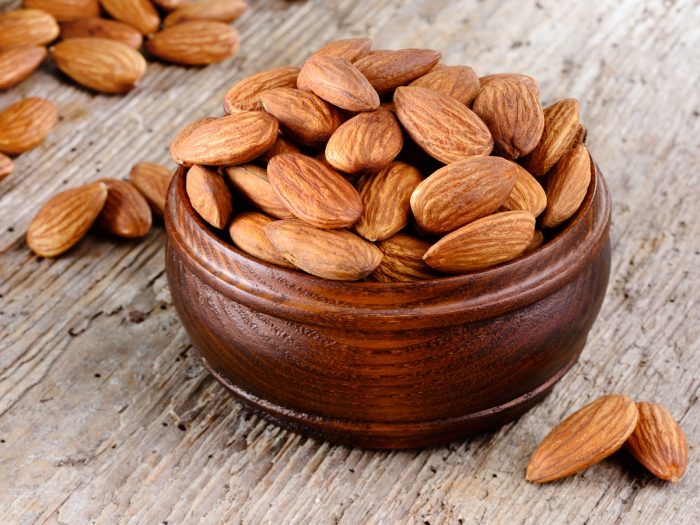
Rich, crunchy, and beautiful brown-cased almonds are not only one of the most nutritious and versatile nuts in the world, but they are also renowned for their culinary use and health benefits.
1. Keep Heart Healthy
Nut and seed intake is considered safe for your heart and almonds are one of the most essential nuts for heart health. Almonds are rich in monounsaturated fats and can reduce LDL effectively. They increase dramatically the number of antioxidants in the bloodstream, decrease blood pressure, and improve blood flow. Several studies have shown that almonds are effective in lowering LDL.
2. Prevent diabetes
Almonds, though nutritionally beneficial to diabetes patients. Research has shown that almonds can help to stabilize and reduce blood sugar increases after meals, and to prevent diabetes. One research showed that people who ate 2 ounces of almonds a day had lower rates of fasting insulin and glucose.
3. Boost Immune Power
A recent study has suggested that almonds, especially almonds skin, can support the functioning of the immune system. Almonds are high in vitamin E which acts as an antioxidant in your body and helps the functioning of the immune system. Almonds also contain iron and protein essential to your immune system. They also contain zinc which has been related to common cold prevention and treatment.
4. Brain food
Almonds can be considered “brain food” because they contain both L-carnitine and riboflavin-two nutrients that are very important for the maintenance of brain health. Almonds are among the best sources of vitamin E in the world. Healthy levels of vitamin E, which regular intake could potentially reduce cognitive decline, increase alertness and preserve memory for longer.
5. Good for Eyesight
Almonds are definitely one of the best foods to add to your daily diet to keep your eyes healthy because they are enriched with vitamin E, biotin, riboflavin, copper, manganese, iron, omega-3, and protein. The vitamin E of almonds can help both prevent age-related macular degeneration and cataracts. Omega-3 will make your eyesight better and reduce the risk of eye strain. It can also prevent a condition called ‘Glaucoma’ which leads to loss of vision.
Read our article top 6 food for eye health to know more food good for eye.
6. Helps in Managing Weight
Almonds are an excellent protein source, but may also have a considerable fat-burning capacity. Eating almonds on a daily basis is associated with increased weight loss and improved fat metabolism. Eating lots of almonds will potentially reduce your “poor” LDL cholesterol levels, boost your lipid profile and increase fat burning in your belly region.
7. Skin Beauty Secret
The high levels of naturally occurring antioxidants in almonds help to hydrate skin. They are filled with biotin, which is important for healthy skin , hair and nails to stimulate keratin development. Inculcating almond diet daily in your routine will not only give you clean, acne-free and pimple-free skin but also keep your skin soft and serve as a secret to anti-aging beauty!
8. Improve Bone Health
Almonds contain calcium, magnesium, manganese, copper, vitamin K, potassium, and zinc, as well as protein and other nutrients that help the building of strong bones and osteoporosis prevention.
9. Good for liver
Almonds are rich in unsaturated fatty acids, antioxidants and vitamin E. These compounds can help to protect against liver disease, and reduce inflammation and oxidative stress. Note also that almonds are filled with good fats and fibre, all of which help the liver detoxify the body.
10. Good for Mom to be
The high protein content in almonds allows a growing baby to gain muscle mass in a healthy way. This also causes the energy in the mother to cope with the pain of childbirth. It controls the baby’s safe birth weight too. Almonds are rich in minerals such as copper, manganese, and phosphorus, and they constitute a great source of vitamin E. Almonds can also help regulate blood sugar, blood pressure important to lower preeclampsia risk in pregnant women